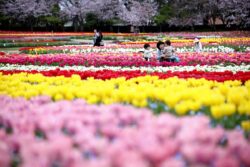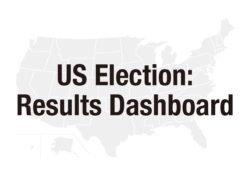Kishida and nuclear disarmament / Seeking realistic approach between nuke-free world, U.S. nuclear umbrella
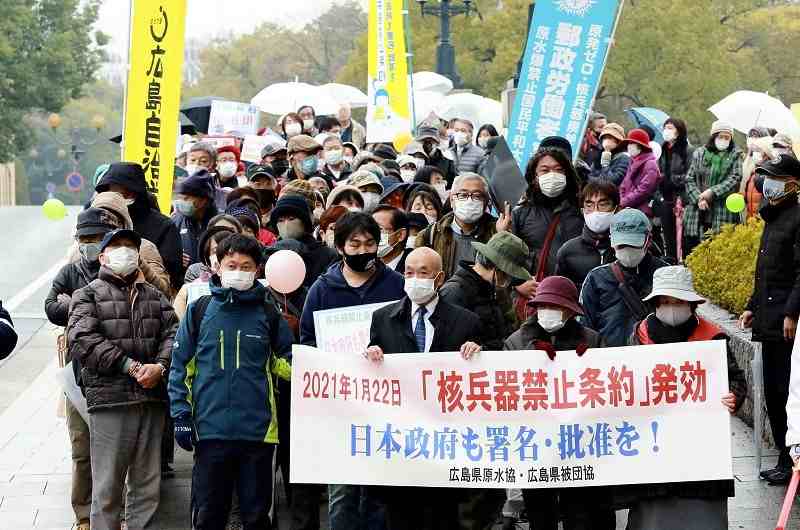
Members and supporters of Hiroshima branch of Gensuikyo (Japan Council against Atomic and Hydrogen Bombs) march in Hiroshima holding a banner in their hands, as the nuclear weapons ban treaty entered into force on Jan. 22, 2021.
20:00 JST, August 2, 2022
As the world faces a growing nuclear threat exacerbated by Russia’s invasion of Ukraine, among other factors, this series explores the strategy and prospects of Prime Minister Fumio Kishida’s nuclear disarmament-related diplomacy. This is the second installment in a three-part series.
※※※
Prime Minister Fumio Kishida’s drive to tackle nuclear issues can be traced back to the tragedy inflicted by the U.S. atomic bombings, the effects of which have been drilled into him since infancy.
Kishida, 65, was born on July 29, 1957, in Tokyo, the eldest son of Fumitake Kishida, a bureaucrat of the then Ministry of International Trade and Industry. Every summer Kishida would visit Hiroshima, his father’s hometown, and whenever the Aug. 6 Peace Memorial Ceremony drew near, his grandmother Kazuko would recount the experiences of victims of the atomic bombings.
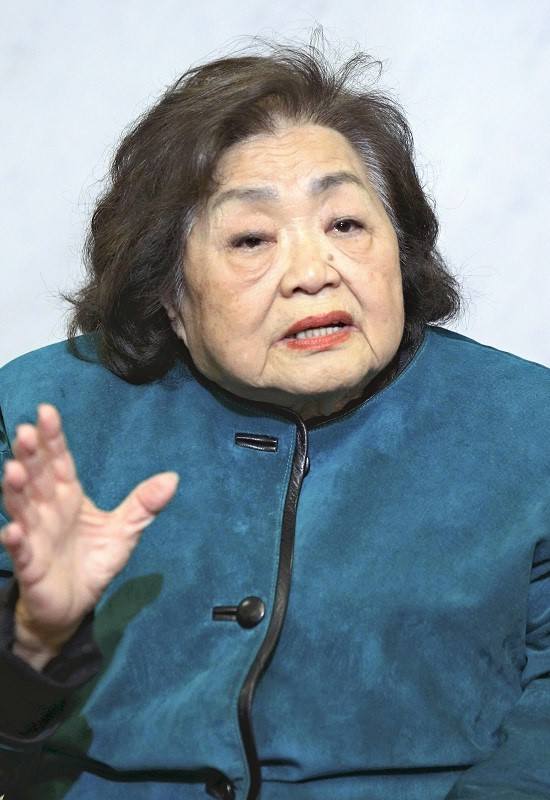
Setsuko Thurlow, 90, is a distant relative of Prime Minister Fumio Kishida and a victim of the U.S. atomic bombing of Hiroshima. She lives in Canada and works with the International Campaign to Abolish Nuclear Weapons (ICAN). (Photo taken Nov. 24, 2019, in Hiroshima.)
Many of his relatives were exposed to radiation from the atomic bomb. Setsuko Thurlow, 90, is a distant relative of Kishida’s and a victim of the Hiroshima atomic bombing who lives in Canada. Thurlow works with the International Campaign to Abolish Nuclear Weapons (ICAN), a coalition of civil society organizations calling for the abolition of nuclear weapons.
ICAN promotes the implementation of the Treaty on the Prohibition of Nuclear Weapons, which comprehensively prohibits nuclear weapons, including the development and possession of such weapons. The organization received the 2017 Nobel Peace Prize.
While Kishida continues to bear with him the experiences of the victims of the Hiroshima atomic bombing, he faces a hard choice between his ideal of realizing a “nuclear weapons-free world” and the reality of Japan having to rely on the U.S. nuclear umbrella for nuclear deterrence.
In connection with the nuclear weapons ban treaty, Kishida, as foreign minister in October 2016, briefly revealed an eagerness to take part in the treaty negotiations, saying, “I would like to proactively take part and assert what we should assert.”
But the United States called on its allied nations not to take part in the negotiations, on the grounds that the negotiations would decisively pit those countries with nuclear weapons against those with no such weapons. Then Prime Minister Shinzo Abe thus decided to forgo Japan’s participation in the negotiations.
Eventually, Kishida had to compromise by having Nobushige Takamizawa attend as disarmament ambassador only the first day of negotiations in March 2017 to express Japan’s nonparticipation.
“Kishida agonized very much over the decision as a foreign minister who was elected to represent Hiroshima,” said Takamizawa, 66. “He might have thought, ‘It is also reasonable to take part in the negotiations from the perspective of listening to what other people have to say.’”
Even now, with the nuclear weapons ban treaty having already entered into force in January 2021, there are still unceasing calls from Hiroshima and Nagasaki, the two cities struck by the U.S. nuclear bombs, for Japan to join the treaty. In the first Meeting of States Parties to the Treaty on the Prohibition of Nuclear Weapons held in June this year, a conference held after Kishida took office, Germany participated as an observer, while the mayors of Hiroshima and Nagasaki gave speeches.
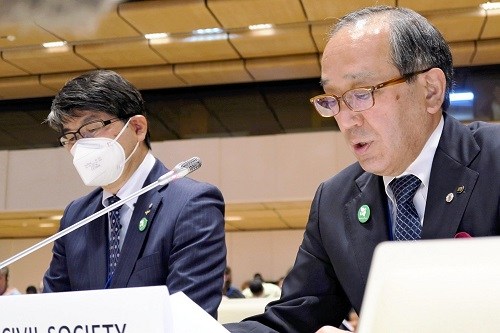
Hiroshima Mayor Kazumi Matsui, right, gives a speech beside Nagasaki Mayor Tomihisa Taue on June 21 at the first Meeting of States Parties to the Treaty on the Prohibition of Nuclear Weapons in Vienna.
But Kishida refrained from dispatching a government official to the meeting. Within the Japanese government, there runs a broad vein of distrust toward ICAN, which has called on Japan to participate in the meetings. As a senior Foreign Ministry official put it, “ICAN turns a blind eye on the harsh security environment in Asia, while it carries on with repeated criticisms of Japan alone.”
An expert on nuclear issues pointed out, “ICAN has a huge limitation in that it cannot convey its message to autocratic states, such as China and North Korea, where there are no civil society organizations to cooperate with it.”
Germany does not have nuclear weapons but continues to participate in the nuclear sharing program of the North Atlantic Treaty Organization through which it can employ U.S. nuclear weapons deployed on its soil in times of emergency. As Germany has been engaged more deeply than Japan in the nuclear deterrence system, Berlin’s relationship with Washington has not been shaken even after its participation in the Meeting of States Parties as an observer.
A special envoy from Germany also made clear at the meeting that the nation cannot join the nuclear weapons ban treaty because participation in it runs counter to the country’s position as a NATO member state.
To reduce nuclear arms, it is vital to persuade nuclear nations, among which the United States, the United Kingdom and France all have the patential to listen to Japan’s entreaties. Kishida, through these three countries, even intends to try to persuade China and Russia.
Speaking of Japan’s participation in the nuclear weapons ban treaty, a former foreign minister belonging to the Liberal Democratic Party said dismissively: “The U.S., U.K. and France would turn their backs on Japan. We could lose those channels. There would be no merit whatsoever.”
“In any case, I will take a realistic approach,” Kishida has reportedly told those close to him. He appears poised to seek steady progress in nuclear disarmament, toward the ultimate elimination of nuclear weapons.
"Politics" POPULAR ARTICLE
JN ACCESS RANKING


